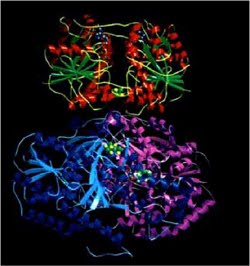This ScienceDaily article provides good evidence for what I have long postulated is the way memory functions is set up and functions--i.e., that the brain uses a molecular addressing system to mark a network, a pattern, of neurons that constitute a specific memory.
Just as we put addresses into the nodes on a computer network so that messages get to the right one, so the brain does something similar. We, subconsciously, have emulated, very crudely, how our own brains work.
And just as a computer network hunts for the right node, so a neuron hunts for the connections that have the same molecular marker on a synapse. That explains why we almost get a memory, it is on the tip of our tongues, then 'Ah, got it!' as the last neurons are found.
That system would also make the most efficient use of neurons, because the same ones could be used for many different memories. Each one could have many different molecular addresses, linking it under different circumstances to a vast range of different network patterns. Otherwise the brain would be in danger of running out of storage. But with a hundred billion neurons, each with a myriad of molecular addresses, the storage and processing power would be infinite.
skip to main |
skip to sidebar



Thoughts on the fundamental logic--i.e., the molecular logic--of life, plus other life items (the first are copied from my EStar blog, from 2006 onwards). The foundation of life is the logic of the atom; built on that is the logic of the molecule; built on that is the logic of the cell; built on that is the logic of the organ; built on that is the logic of the organism.


Popular Posts
-
This article from the online entity of Science , published by the American Association for the Advancement of Science, is yet more proof of ...
-
THE REAL ORIGIN OF SPECIES — BIODEVELOPMENT — by NOBILANGELO CERAMALUS (pronounced noble- arn -jillo kerra- mar -liss) Member of the Americ...
-
Using very fine electrodes, researchers have revealed some of the astonishing processing-power of a single human neuron. Full story at ht...
-
Bio-molecules are network processors. A cell is a collection of molecular network processors. The individual processing is affected by the b...
-
This article gets close to saying what this blog has been saying for years . Bio-molecular logic and processing operates over the aeons to ...
-
As this blog has been saying for years, the so-called 'junk' DNA is not junk. To use computer terms, DNA is CPU, RAM, disk drive, o...
-
The process of transcribing DNA instructions into proteins has now been found to be a lot smarter than previously imagined. A detailed com...
Total Pageviews
NOTE ON TOTAL PAGEVIEWS
Blogger's statistics have not been operating since the start of this blog. Only since mid 2009.
About Me

- Nobilangelo
- My Christian name is pronounced 'noble-arn-jillo' (i.e., both o's are long, so the first two syllables rhyme with 'noble' not 'hobble'--yes, I know that's obvious, because there's only one 'b' between the 'o' and the 'i', but some people seem to see two b's, hence the English lesson). My surname is pronounced kerra-marliss. I was born, bred and educated in New Zealand, except for an international systems-engineer's course in San Antonio, Texas. I am born-again Christian, a thinker with a very practical turn of mind, a scientist with a particular interest in planet-friendly energy and neuroscience, an engineer (mechanical, industrial and IT systems), an inventor, a Member of the American Association for the Advancement of Science, a writer and poet, a naturist, a designer in different fields, an arranger and composer of symphonic music, a multi-award-winning IT journalist, a photographer, and a practitioner at various times in other hands-on fields including building, metalwork, woodwork, stained-glass and landscaping.